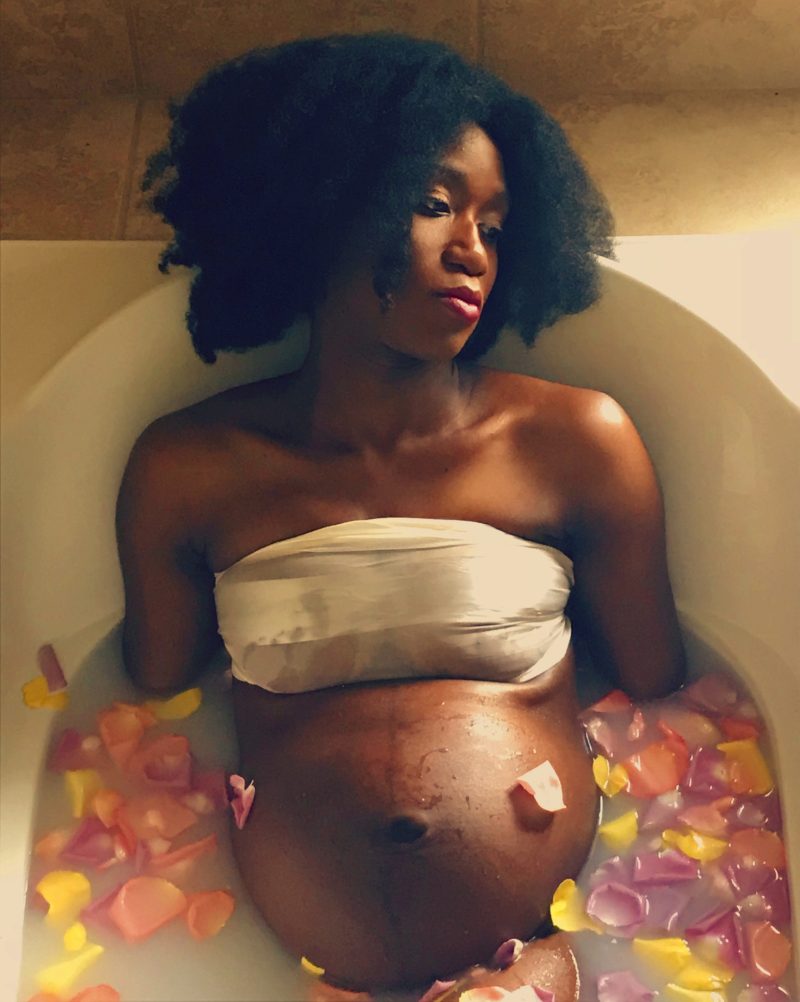
Source: Herve Joseph / EyeEm / Getty
There is no party like a Black baby shower. It’s the time when we all gather (often putting age-old disagreements aside) to stuff our faces, play ridiculous games and celebrate a new life entering the world. Celebrating a new baby has always been important, but even more so this year as we continually experience unparalleled loss exacerbated by the COVID-19 pandemic.
For many Black women, a life transition that should be marked with joy and support is too often faced with disappointment, despair and even death. As Reproductive Justice advocates dedicated to ending the Black maternal health crisis, every Domestic Violence Awareness Month brings a cruel reminder of what Black mothers and birthing people experience during the vulnerable pregnancy and postpartum periods. In New York City, where we reside, just last month 31 year-old Shanice Young was fatally wounded by a former intimate partner in front of her home, shortly after her baby shower. She was nine months pregnant. We mourn her life and the lives of all parents and children prematurely stolen at the height of their promise.
Unfortunately, what Shanice’s family and community are experiencing is part of a larger epidemic of intimate partner violence disproportionately experienced by Black women and girls. Homicide is a leading cause of maternal mortality, and it is totally preventable. An upcoming analysis of 2018-2019 maternal mortality data led by Tulane University’s School of Public Health and Tropical Medicine proved that homicide was a leading cause of maternal death. Unacceptably, 50 percent of women killed during and after pregnancy are Black.
Thrilled that our poster was among the winners selected at #SER2021 @NOLAobgyn @KelDaroe @KiaraMCruz_ @DovileVilda. It helps shine a light on these lives. They aren’t counted as cases of maternal mortality. But they count. https://t.co/99L6Qcm5sF pic.twitter.com/3gXRaPmQK4
— Maeve Wallace, PhD (@maeveellen) June 25, 2021
The COVID-19 pandemic has only worsened domestic and intimate partner violence globally, according to UNWomen. In cities across the United States, calls to domestic violence hotlines and police reports skyrocketed following COVID stay-at-home orders. Increased violence exposure threatens an already fractured healthcare landscape wherein “clinicians have seen the number of pregnant people infected with COVID-19 rise” according to the Centers for Disease Control. While telemedicine has been able to fill the gap for some maternity healthcare needs, it can actually be challenging and even harmful for those whose very homes are unsafe.
The Black maternal health crisis will not end until we dismantle racialized gender oppression. Actually, Black premature deaths overall will not end until we dismantle racialized gender oppression. Scholar Kimberle Crenshaw (who coined the term “intersectionality”) and the African American Policy Form launched the #SayHerName campaign to “bring awareness to the often invisible names and stories of Black women and girls who have been victimized by racist police violence” and provide support. The idea that Black women, girls and femmes can be “owned,” controlled and disappeared with impunity contributes to homicides of Black people across marginalized gender identities and expressions, as illustrated by R&B superstar R. Kelly’s decades-long sex trafficking enterprise and abuse suffered by Black and Latinx trans women.
Every life that has been violently snuffed out because of racist, misogynistic violence deserves to be acknowledged and lovingly remembered. And more importantly, we need violence free communities that allow Black mamas and birthing people to experience their full sexual and reproductive pleasure, health and wellbeing. Harassment, assault and homicide are not facts of life, they are created and enabled by political structures and norms. For example, “prohibiting possession of firearms and requiring relinquishment of firearms by people convicted of domestic violence” reduces homicide risk for pregnant and postpartum women. Dismantling gender-based violence will require a sustained anti-oppression commitment to transforming healthcare, social services and law enforcement systems (from training to service provision) to adapt to survivors’ needs.
Black women and gender expansive people continue to organize to save our own lives even when the movements and political parties that depend upon us abandon our policy demands. As survivors and observers of intimate partner violence, we know firsthand how too often we alone ensure our own safety. We alone heal from the shattered dreams that intimate partner violence litters over bodies and generations. We stand with organizations, like Black Women’s Blueprint and other restorative justice coalitions, that are doing the hard work of truth and reconciliation. They know this work is urgent and steadfast all at once. While we lift up stories and survivors and the organizations that support them every Domestic Violence Awareness Month, creating a world where Black women, girls and femmes can live without fear is a daily mission for all of us. We cannot wait for another murder to make the news to take action. There is no greater urgency than now to prevent these tragic deaths and implement solutions. No one’s life should end because they wanted a new life to begin.
Kelly Davis, MPA is the Chief of Birth Equity Innovation at the National Birth Equity Collaborative (NBEC). Prior to joining NBEC, Ms. Davis led a series of innovative initiatives for the NYC Department of Health and Mental Hygiene and served as one of the founding members of the Center for Health Equity, where she conceptualized the Family Wellness Suites, community respite and healing spaces for parents and children. Ms. Davis spearheaded planning, implementation and oversight of several special initiatives, including supporting maternity hospitals in a long-term institutional transformation process addressing structural racism, bias, resilience and trauma and catalyzed the City’s first HIV public awareness campaign totally focused on women. Ms. Davis holds a Bachelor of Arts degree from Princeton University, where her senior thesis explored how women of color experienced contraception in the 20th Century, and a Master of Public Administration degree from New York University’s Wagner Graduate School of Public Service.
Kiara Cruz, MPH is a birth equity researcher and patient advocate. She has expertise working with communities to apply evidence-based practices to public health to benefit Black and brown communities, implementing trauma-and-resilience informed systems to maternity care networks, and conducting qualitative research to illuminate the relationships between the social determinants of health and birth outcomes. Ms.Cruz is currently a Senior Research Analyst at the National Birth Equity Collaborative. Ms. Cruz earned her Master of Public Health with a concentration in Maternal & Child Health from Tulane School of Public Health and Tropical Medicine where she is now a doctoral student in Maternal and Child Health Epidemiology.
For more information about the National Birth Equity Collaborative visit birthequity.org or follow on social media: Twitter/IG/FB: @birthequity


